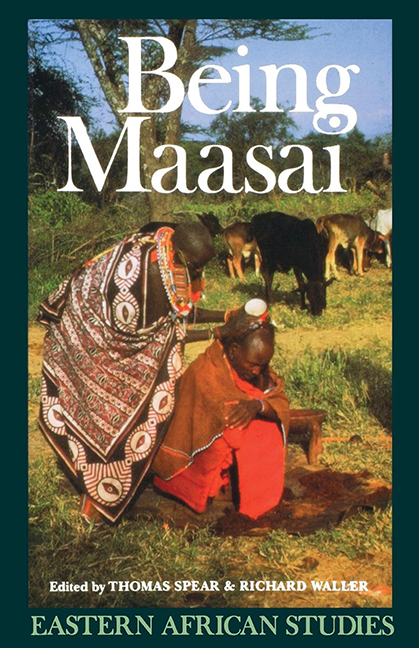Book contents
- Frontmatter
- Contents
- Maps, Figures & Illustrations
- Contributors
- Acknowledgements
- I Introduction
- II Becoming Maasai: Introduction
- 1 Dialects, Sectiolects, or Simply Lects? The Maa Language in Time Perspective
- 2 Becoming Maasailand
- 3 Maasai Expansion and the New East African Pastoralism
- 4 Aspects of ‘Becoming Turkana’: Interactions and Assimilation Between Maa- and Ateker-Speakers
- 5 Defeat and Dispersal: The Laikipiak and their Neighbours at the End of the Nineteenth Century
- 6 Being ‘Maasai’, but not ‘People of Cattle’: Arusha Agricultural Maasai in the Nineteenth Century
- III Being Maasai: Introduction
- IV Contestations and Redefinitions: Introduction
- V Conclusions
- Bibliography
- Index
6 - Being ‘Maasai’, but not ‘People of Cattle’: Arusha Agricultural Maasai in the Nineteenth Century
from II - Becoming Maasai: Introduction
Published online by Cambridge University Press: 30 August 2017
- Frontmatter
- Contents
- Maps, Figures & Illustrations
- Contributors
- Acknowledgements
- I Introduction
- II Becoming Maasai: Introduction
- 1 Dialects, Sectiolects, or Simply Lects? The Maa Language in Time Perspective
- 2 Becoming Maasailand
- 3 Maasai Expansion and the New East African Pastoralism
- 4 Aspects of ‘Becoming Turkana’: Interactions and Assimilation Between Maa- and Ateker-Speakers
- 5 Defeat and Dispersal: The Laikipiak and their Neighbours at the End of the Nineteenth Century
- 6 Being ‘Maasai’, but not ‘People of Cattle’: Arusha Agricultural Maasai in the Nineteenth Century
- III Being Maasai: Introduction
- IV Contestations and Redefinitions: Introduction
- V Conclusions
- Bibliography
- Index
Summary
If Maasai commonly saw themselves and were seen by others as ‘People of Catde’, then the designation ‘Agricultural Maasai’ would seem to be a contradiction in terms.1 Given the degree to which Maasai social relations and cultural values were a function of pastoral economy, Maasai social institutions should have been dysfunctional to an agricultural economy whose needs for organizing resources, production, and labour were significantly different. Given also the cultural arrogance expressed by pastoral Maasai towards others, it would seem equally remarkable that non-pastoralists would have embraced such values as their own.
We have already seen, however, that Maasai embraced a number of such perplexing paradoxes (see Spear, ‘Introduction’, this volume). Peoples of the Rift were highly specialized economically, and yet such specialization necessitated widespread economic interdependence if each people was to live successfully in its own ecological niche. Huntergatherers, farmers, and especially pastoralists each relied on others for many of their basic necessities. High degrees of ethnic differentiation generated by economic specialization were thus balanced by inclusive cultural categories that facilitated social and economic interaction among different groups. Thus Kisongo pastoralists, Okiek hunter-gatherers, and Arusha farmers all participated to some degree in Maasai social institutions together. Expressions of cultural superiority and exclusivity by some were countered by shared values and institutions that encouraged the inclusion of others.
These inherent paradoxes of being Maasai have usually been viewed from the perspective of pastoralists and have given preference to the pastoral way of life. It was the pastoral economy which needed access to others; social exclusivity and inclusion operated on terms favourable to and dictated by pastoralists; and hegemonic Maasai culture was pastoral culture. Given military dominance of the plains by pastoralists in the nineteenth century, such a perspective makes some sense, but it does not help us to understand what being Maasai meant to those who were not pastoralists. How and why did they seek to maintain their identity as Maasai?
- Type
- Chapter
- Information
- Being MaasaiEthnicity and Identity in East Africa, pp. 120 - 136Publisher: Boydell & BrewerPrint publication year: 1993

